Weekly News Recap #Phispers

Sanofi, Earendil Labs ink up to US$ 2.56 bn AI-driven autoimmune drug deal; CDC revises childhood immunization guidelines
The New Year began with two mid-size deals centered around the use
of artificial intelligence (AI) in drug development. Sanofi...
Impressions : 626
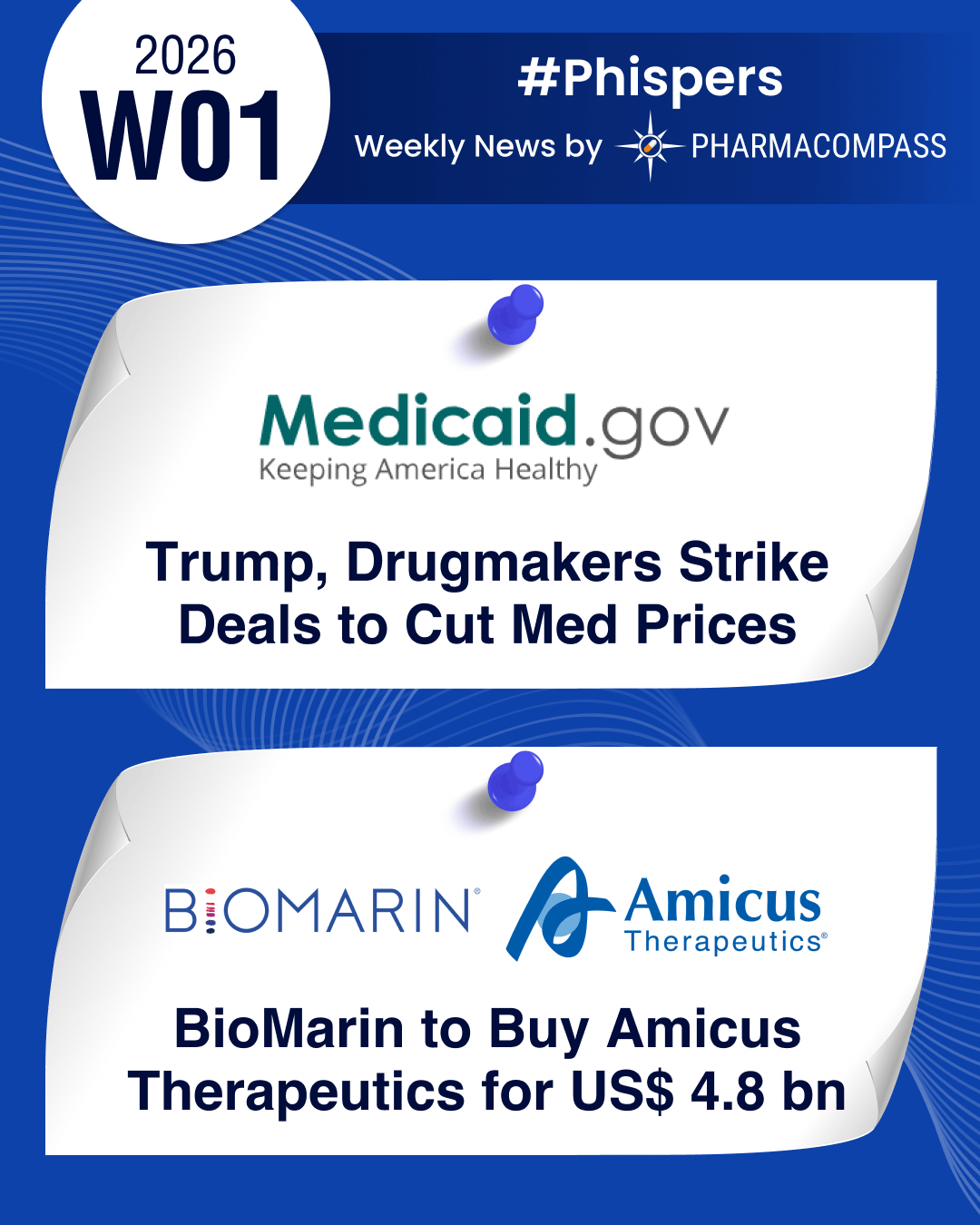
BioMarin inks US$ 4.8 billion rare disease deal with Amicus; FDA approves pill version of Novo’s Wegovy
PharmaCompass
wishes its readers a very Happy New Year and brings news from the last two
weeks in this double-dose edition of...
Impressions : 1057
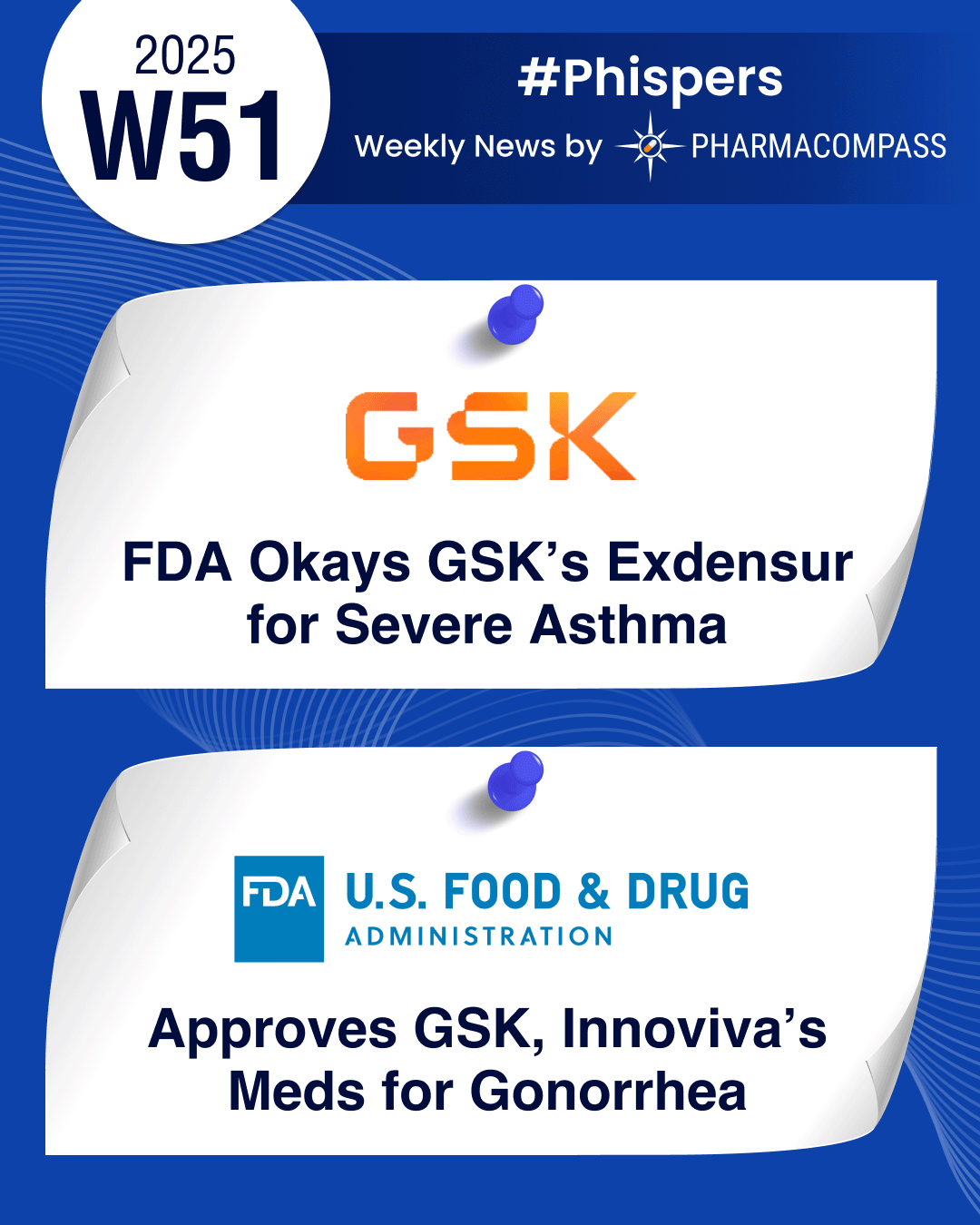
FDA okays GSK’s Exdensur as first biologic, add-on med for severe asthma; issues OAI status to Sun Pharma’s India facility
As the year draws to a close, the US Food and Drug Administration
(FDA) appears busy approving drugs at a fast pace. This week...
Impressions : 957

Lilly to invest US$ 6 bn in new API plant in Alabama; Biocon buys remaining stake in Biocon Biologics, makes it 100% subsidiary
In this week’s Phispers, Eli Lilly announced yet another investment in the US — this time to build its largest API ...
Impressions : 829
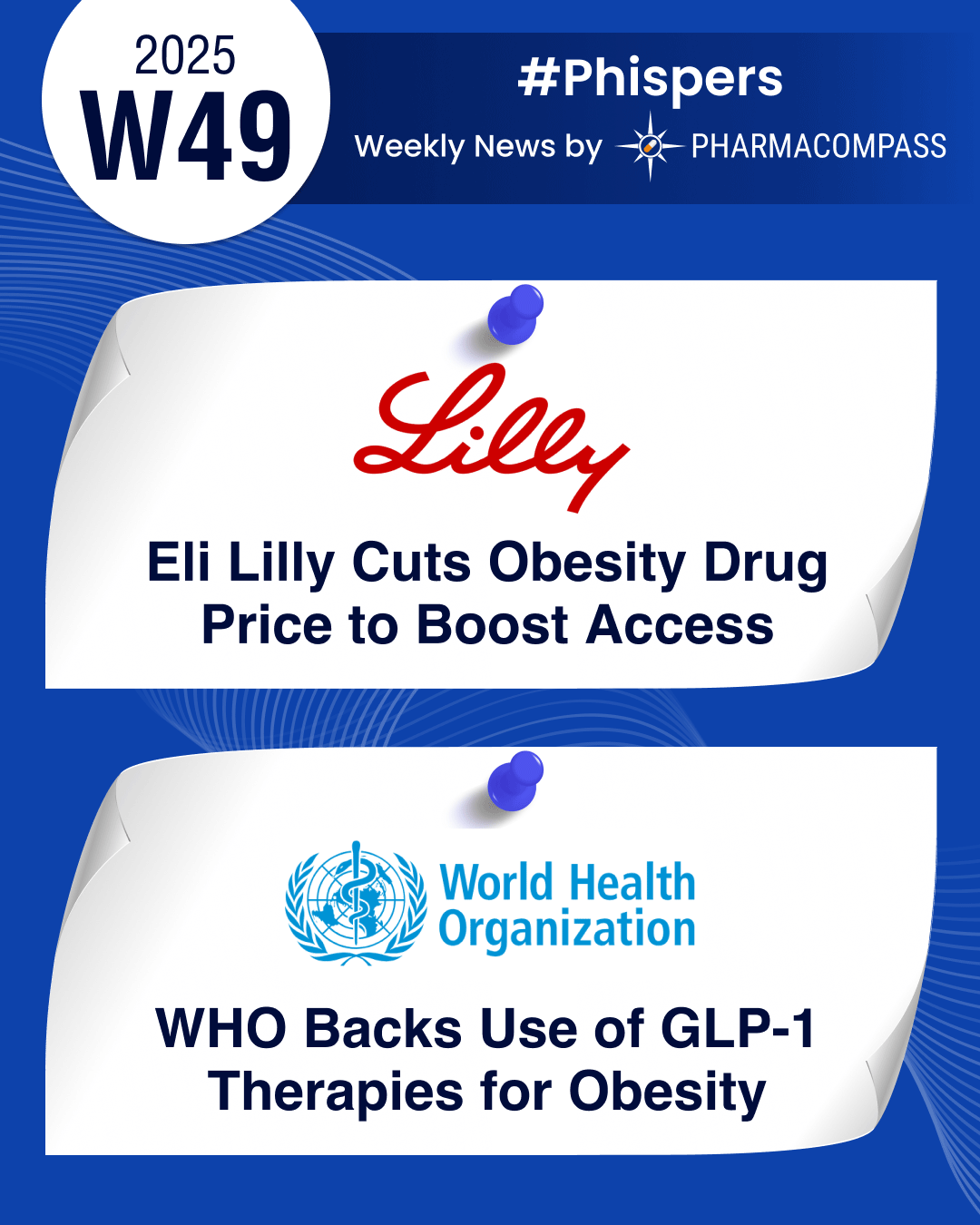
Lilly cuts price of Zepbound; leaked memo on child deaths due to Covid vaccines triggers reaction from former FDA chiefs
In Phispers this week, Eli Lilly reduced prices of its obesity
drug Zepbound sold through LillyDirect, aiming to expand access...
Impressions : 1101
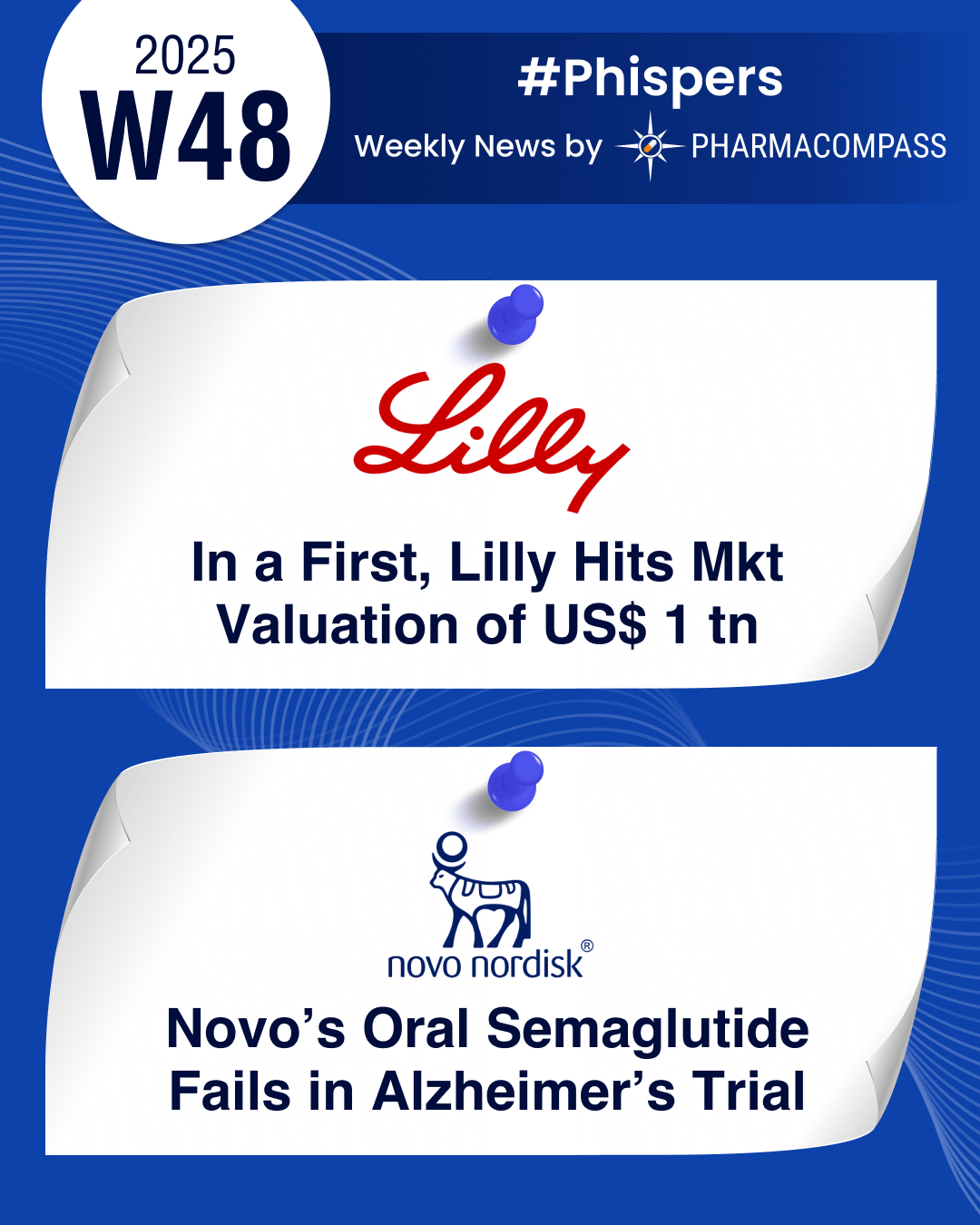
Lilly becomes first pharma to hit US$ 1 tn valuation; FDA clears Padcev-Keytruda combo for bladder cancer
In Phispers this week, Eli Lilly became the first pharmaceutical company to reach a market valuation of US$ 1 trillion, driven ...
Impressions : 1427
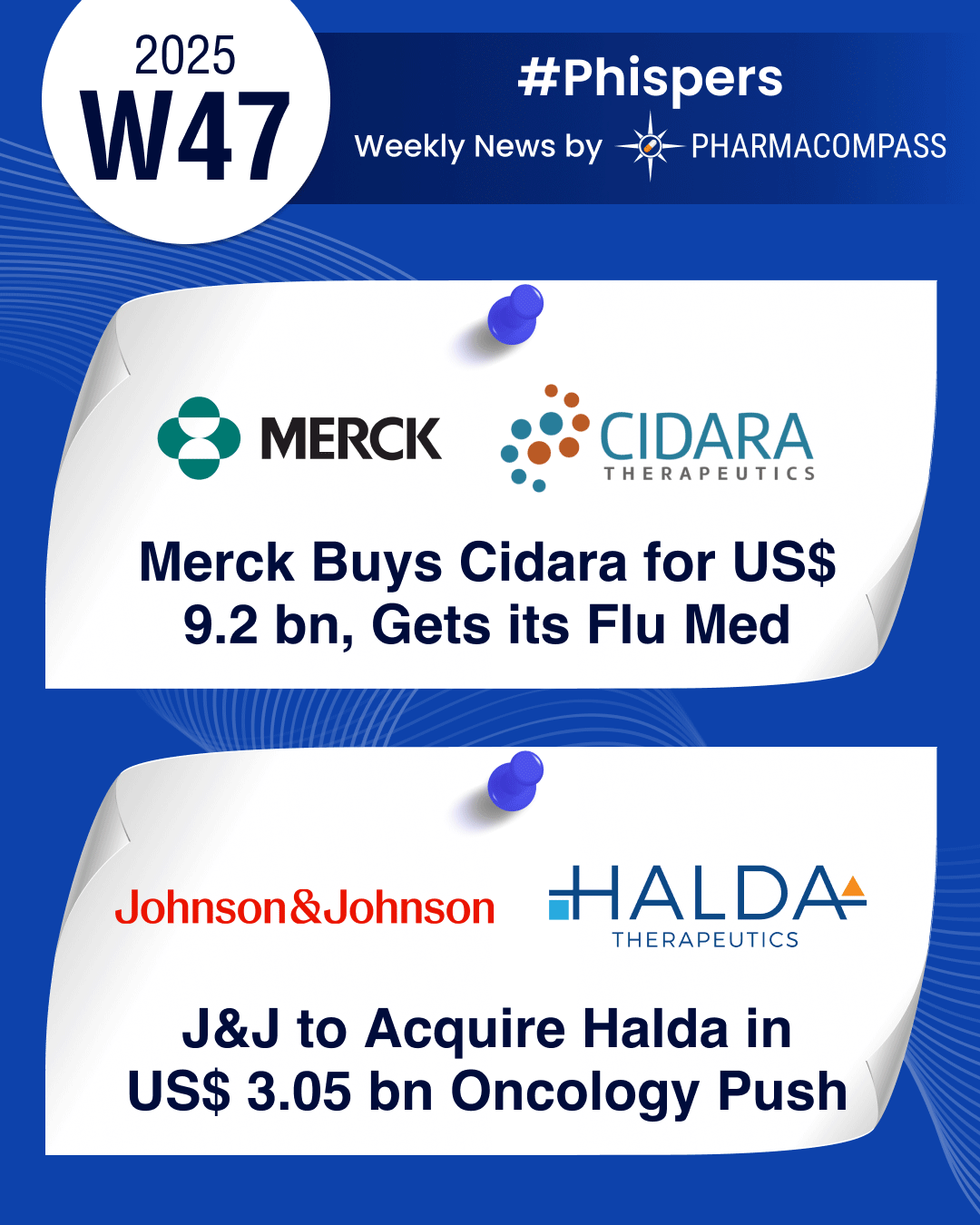
Merck to buy Cidara for US$ 9.2 bn to strengthen infectious disease portfolio; J&J to acquire Halda for US$ 3.05 bn
In this week’s Phispers, Merck struck a US$ 9.2 billion deal to acquire Cidara Therapeutics to strengthen its infectious-...
Impressions : 819
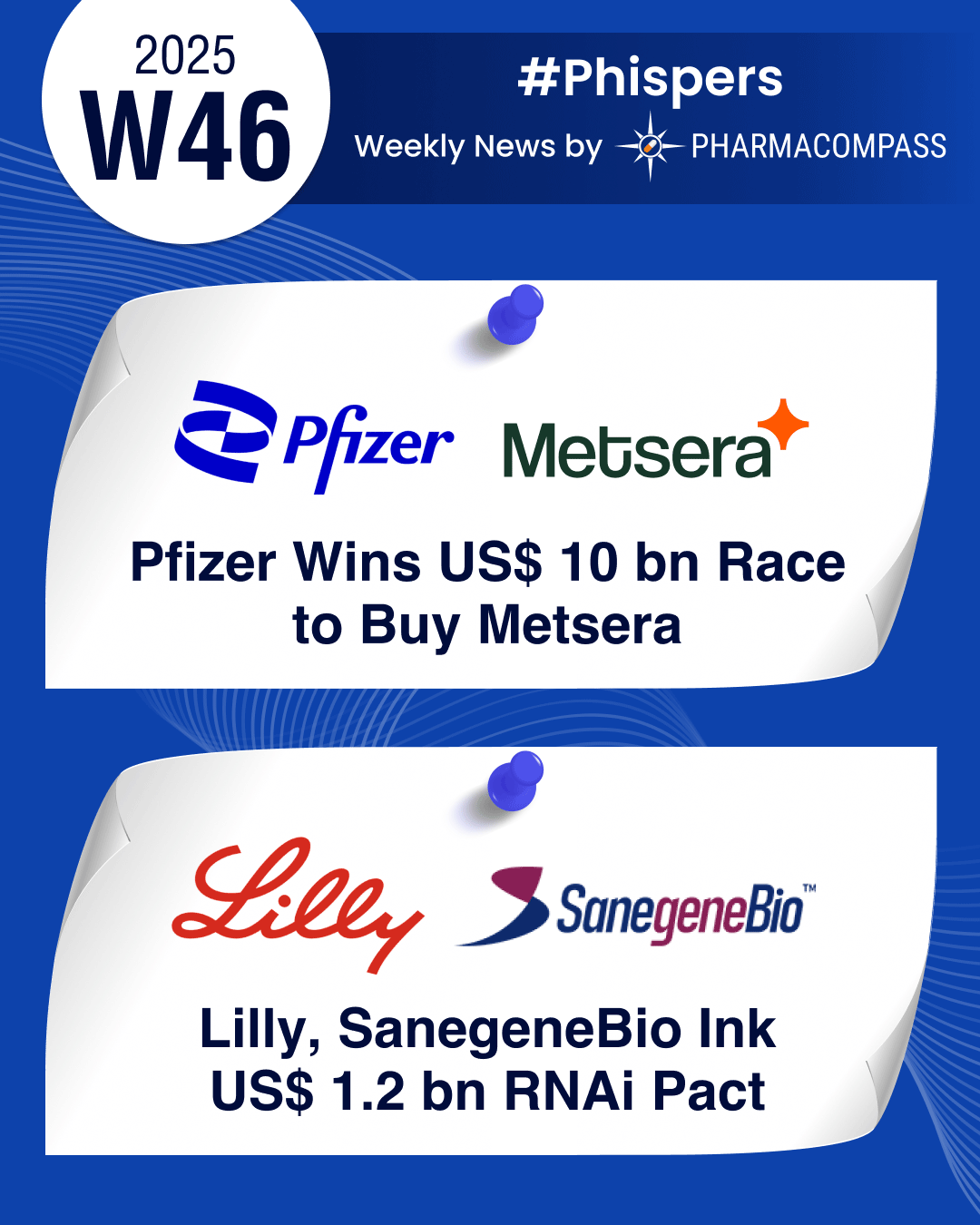
Pfizer seals up to US$ 10 bn deal for Metsera; FDA lifts black box warning on hormone therapies for menopause
In Phispers this week, Pfizer won its high stakes battle with Novo
Nordisk for the obesity-focused biotech Metsera. The deal i...
Impressions : 1117

Pfizer, Novo escalate bidding war for obesity-drug developer Metsera; Kimberly-Clark to buy Kenvue for US$ 48.7 bn
As we return from
our one-week break due to the CPhI Worldwide, we find our double-dose Phispers
edition to be filled with se...
Impressions : 1088
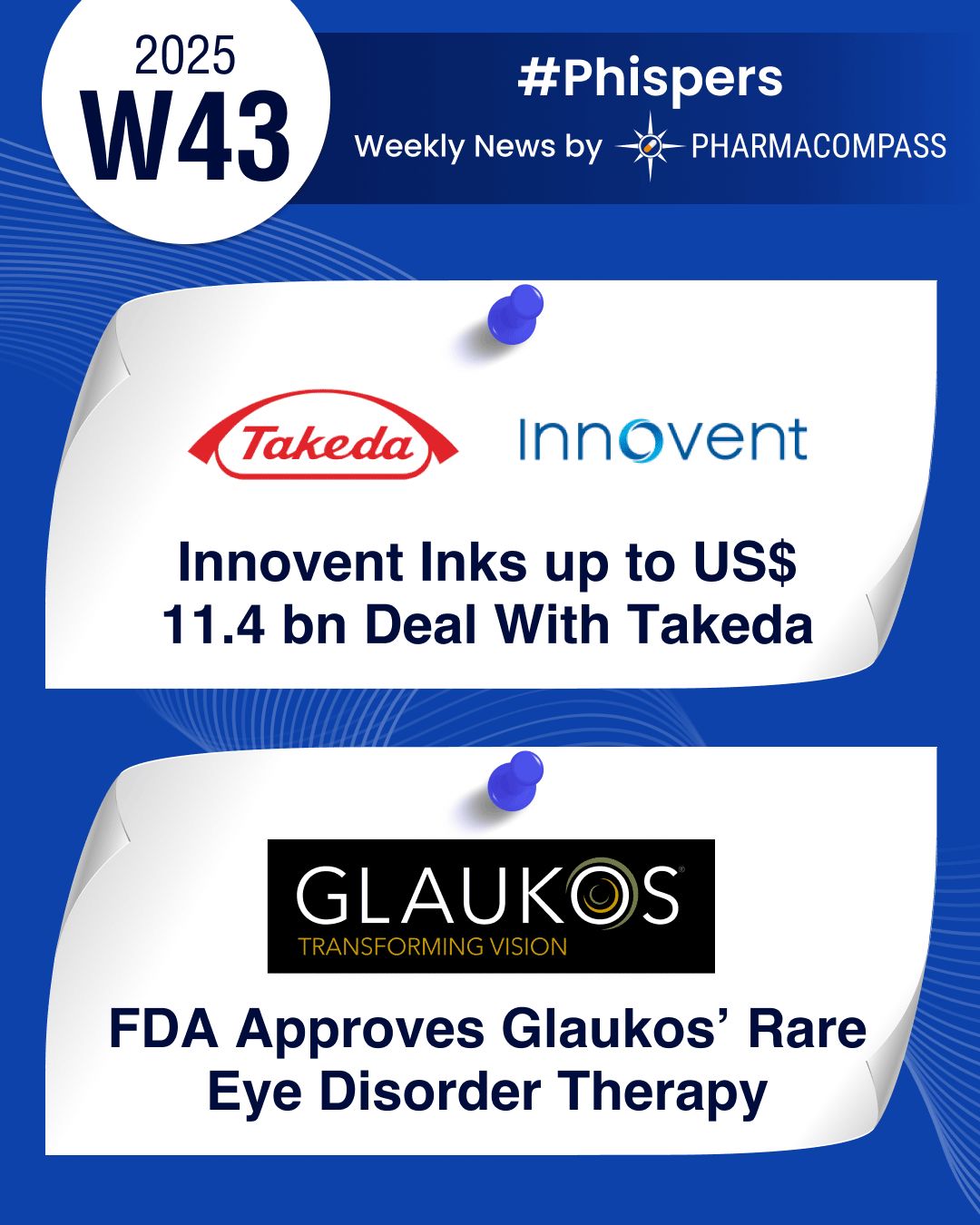
Innovent, Takeda ink up to US$ 11.4 bn oncology deal; FDA clears Novo’s Rybelsus to reduce heart risk in diabetics
In this week’s Phispers, China’s Innovent Biologics signed one of the largest cross-border biotech deals in Asia. U...
Impressions : 1218
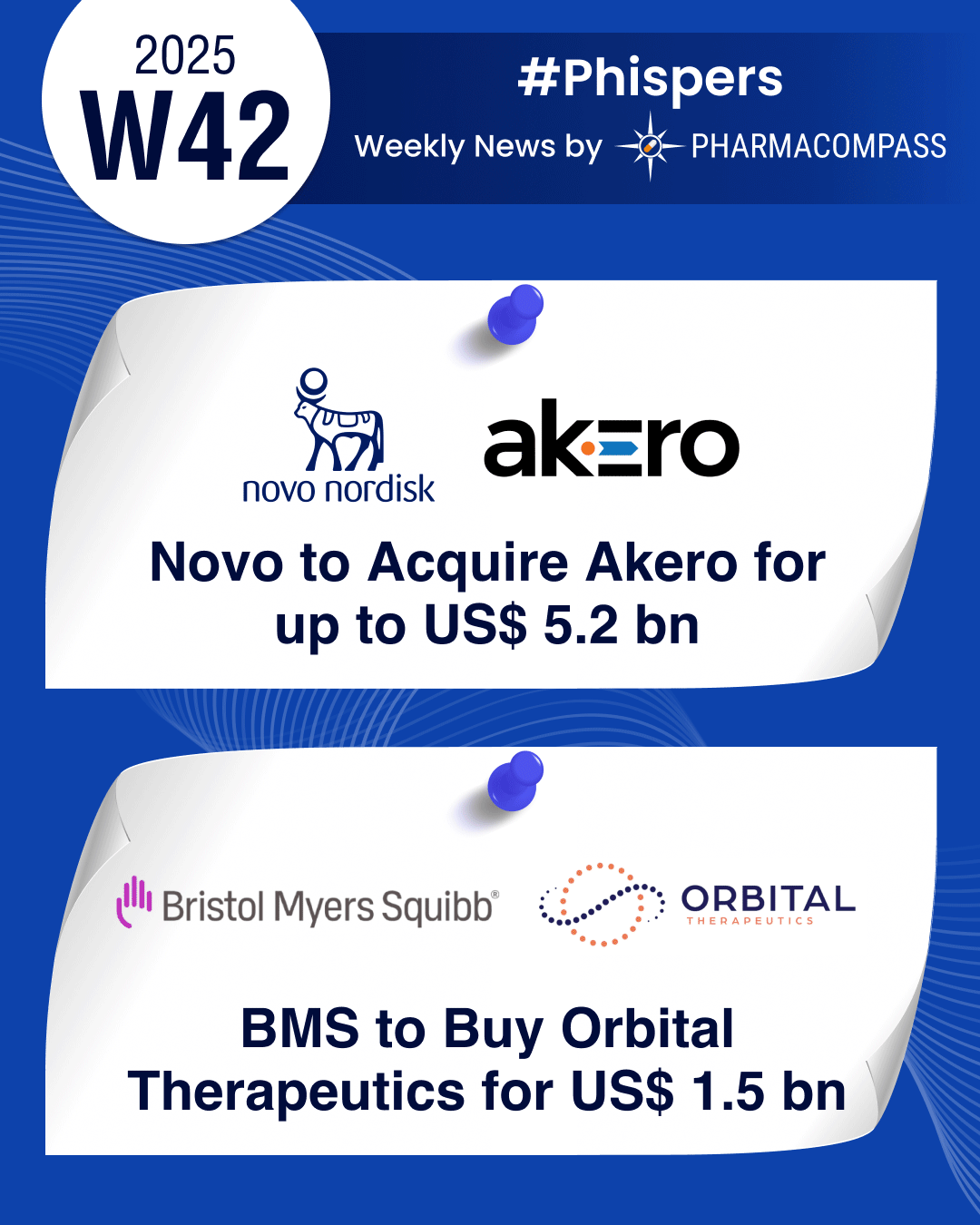
Novo targets MASH with up to US$ 5.2bn Akero buy; BMS acquires cell therapy developer Orbital for US$ 1.5 bn
In this week’s Phispers, Novo Nordisk and Bristol Myers Squibb (BMS) struck multi-billion-dollar acquisitions to expand t...
Impressions : 872
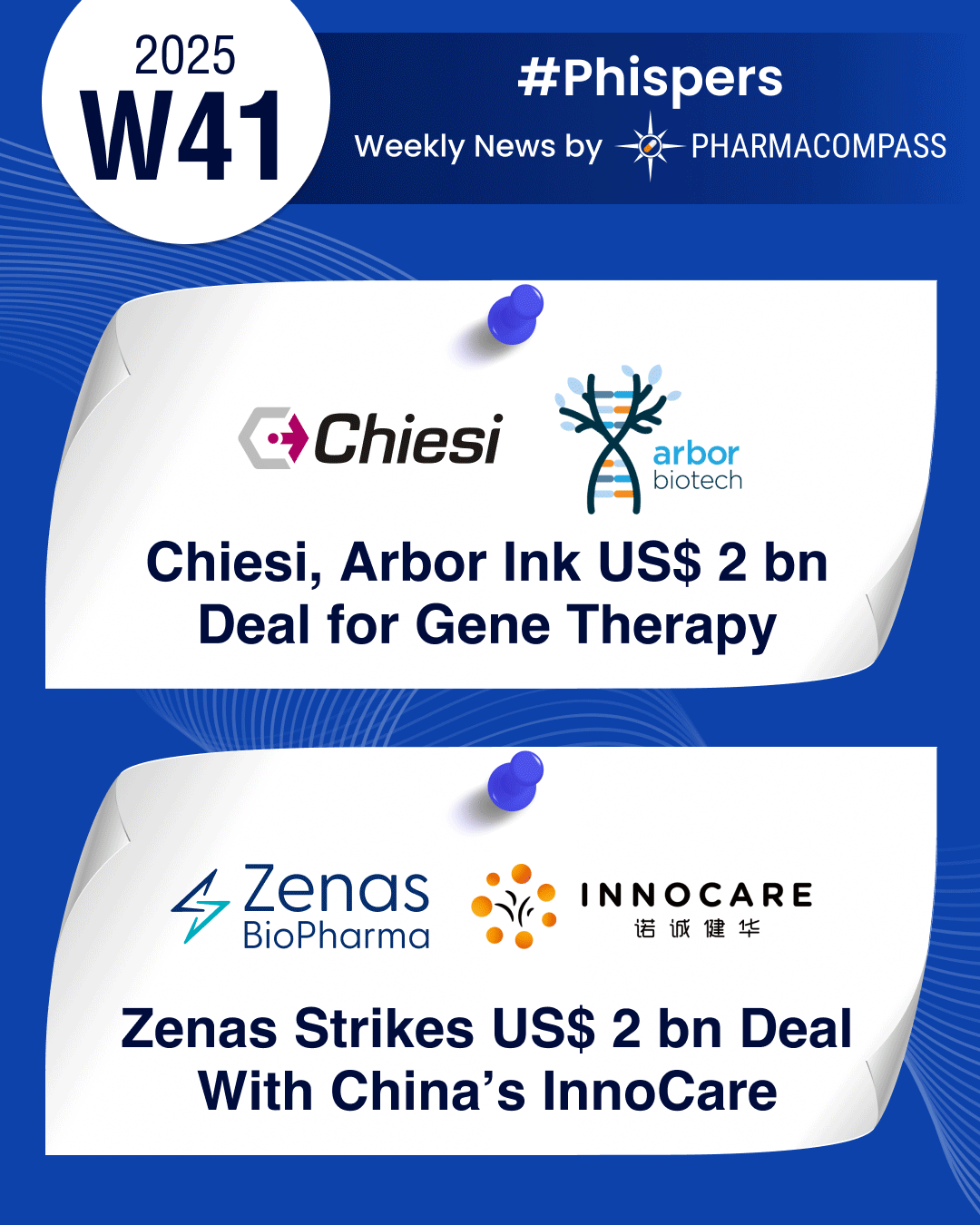
Chiesi, Arbor in US$ 2 bn gene therapy deal; Lilly to invest over US$ 1 bn in India; FDA okays Boehringer’s rare lung disease drug
In news this week, Italy’s Chiesi Group announced a deal worth up to US$ 2 billion with US-based Arbor Biotechnologies to...
Impressions : 3571
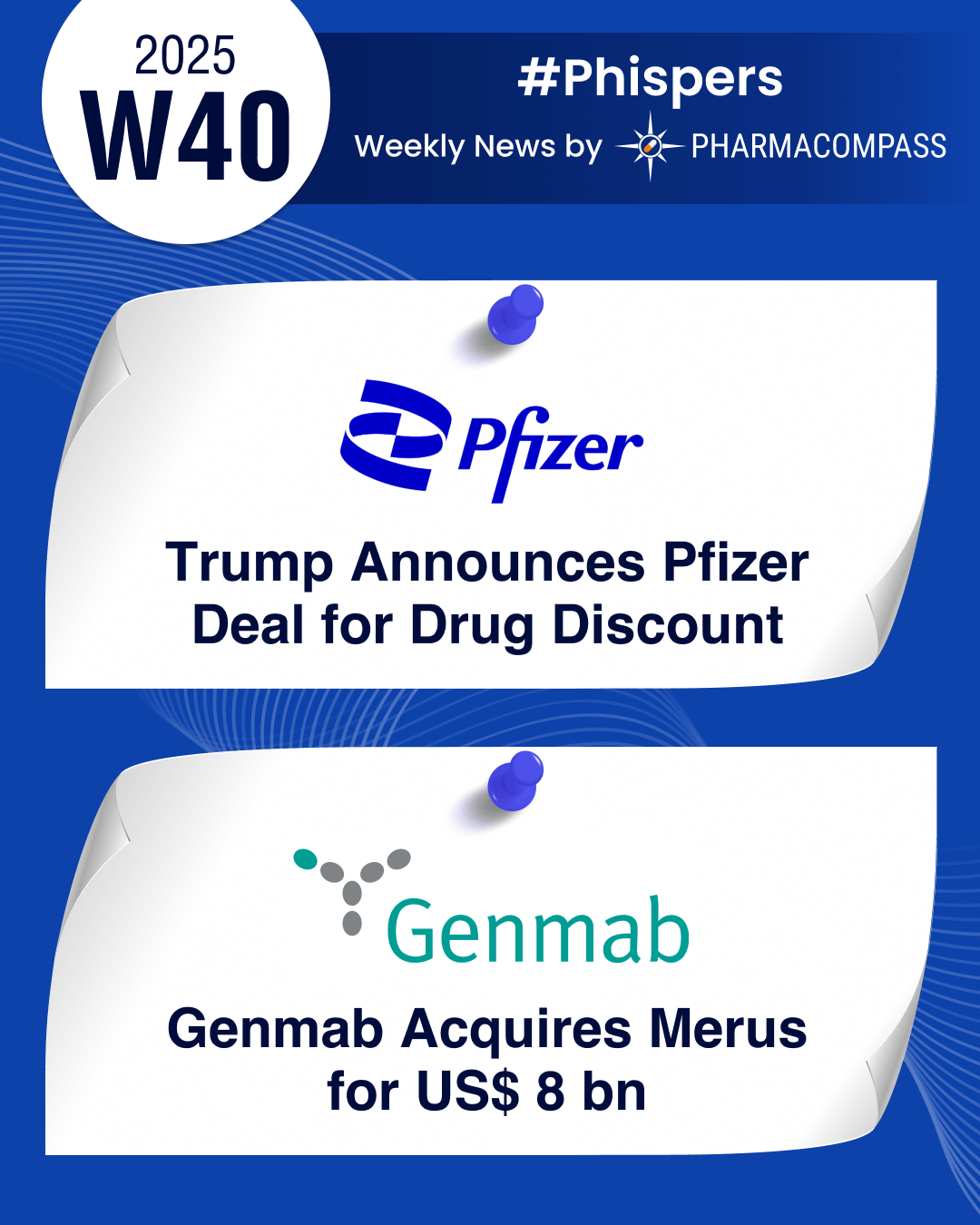
Trump, Pfizer seal deal to offer drug discounts; FDA approves Eli Lilly’s oral breast cancer pill
This week, US President Donald Trump
announced a deal with Pfizer to sell medicines through a new federal website,
TrumpRx.go...
Impressions : 921
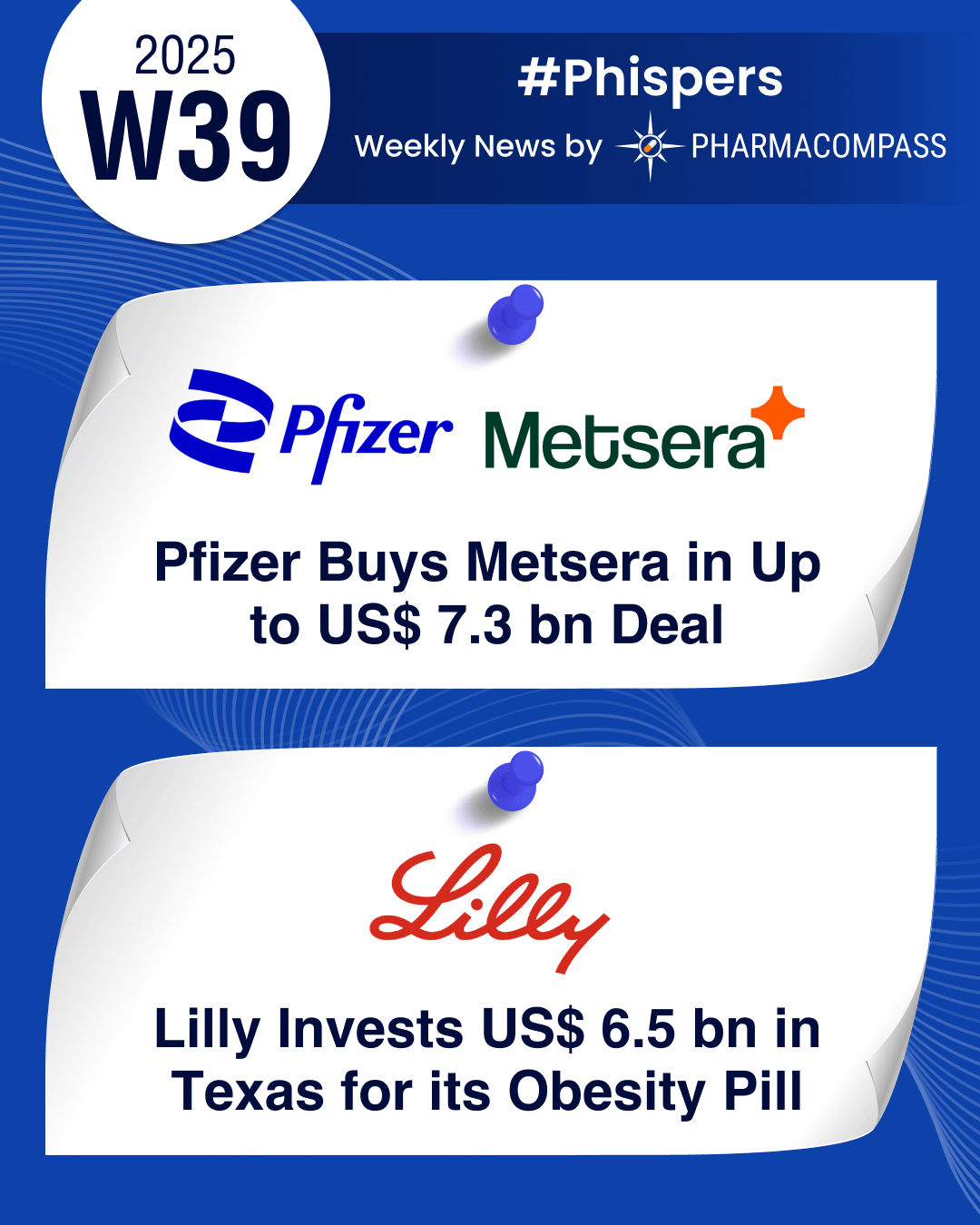
Pfizer buys Metsera for up to US$ 7.3 bn, Roche acquires 89bio; FDA okays injectable version of Merck’s Keytruda
In this week’s Phispers, Pfizer announced the acquisition of New York-based biotech Metsera for up to US$ 7.3 billion, ma...
Impressions : 1561
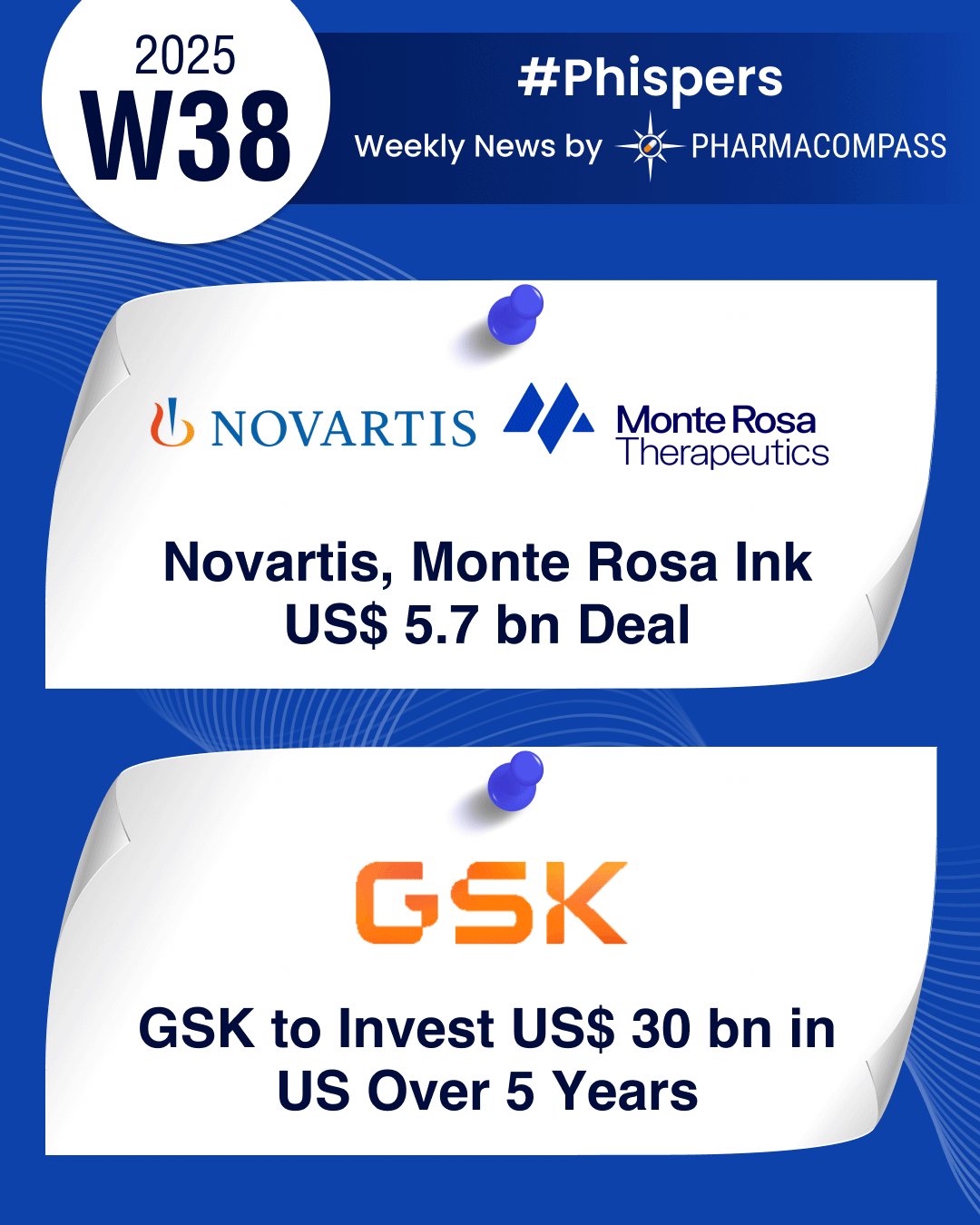
Novartis inks US$ 5.7 bn licensing deal with Monte Rosa for immune-related diseases; GSK, Lilly pledge more investments in US
In this week’s news, drugmakers continued to invest heavily in the US in order to avoid tariffs. GSK said it will invest ...
Impressions : 1116
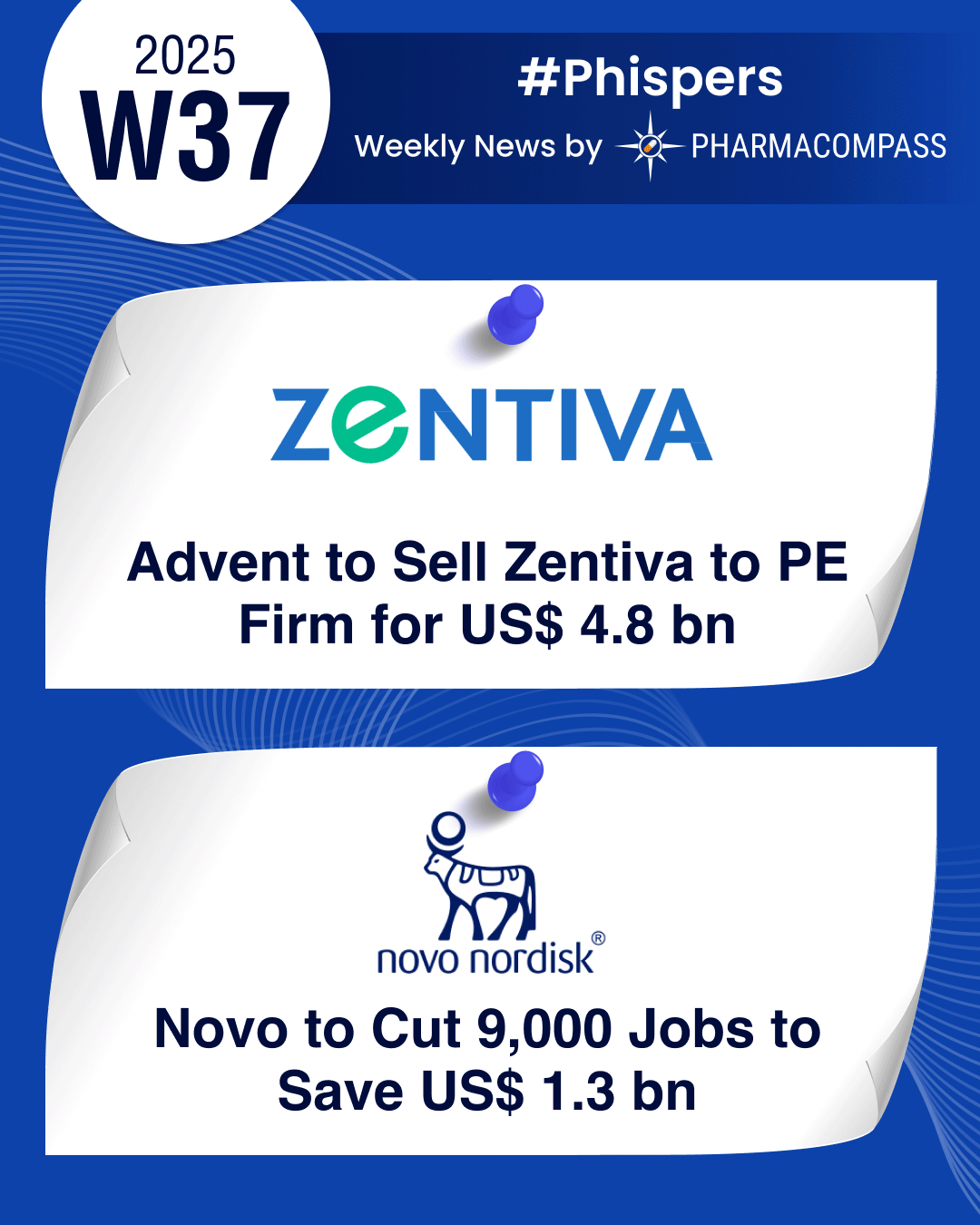
Advent to sell generic unit to PE firm GTCR for US$ 4.8 billion; Novo shapes up for obesity race by cutting 9,000 jobs
In this week’s news, Advent International has agreed to sell the Czech generic drugmaker Zentiva to private equity firm G...
Impressions : 899
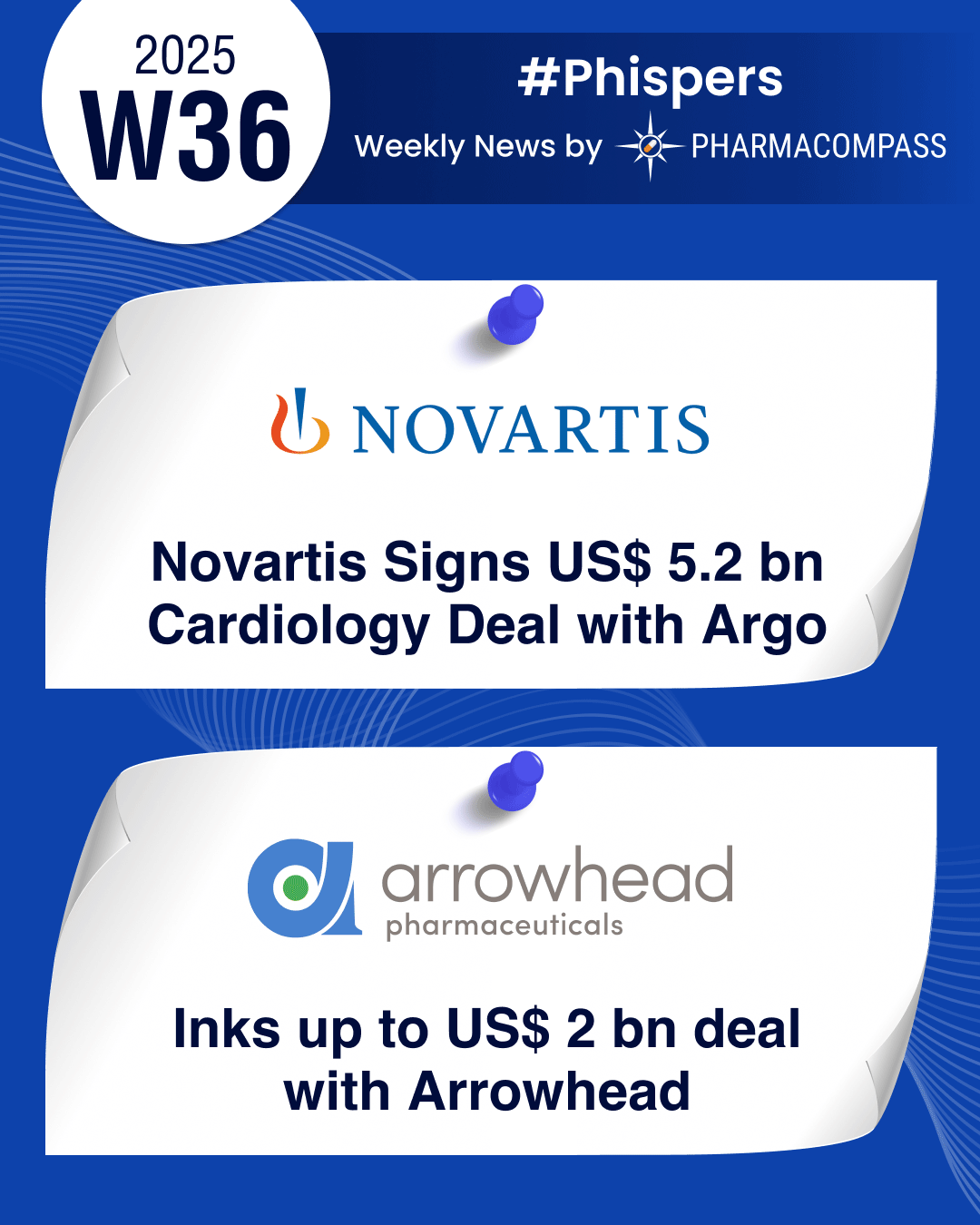
Novartis inks US$ 5.2 bn cardiology deal with China’s Argo, US$ 2 bn deal with Arrowhead; FDA okays first GLP-1 generic for weight
Novartis signed two deals this week — a US$ 5.2 billion cardiology deal with China’s Argo Biopharmaceuticals, and a...
Impressions : 957
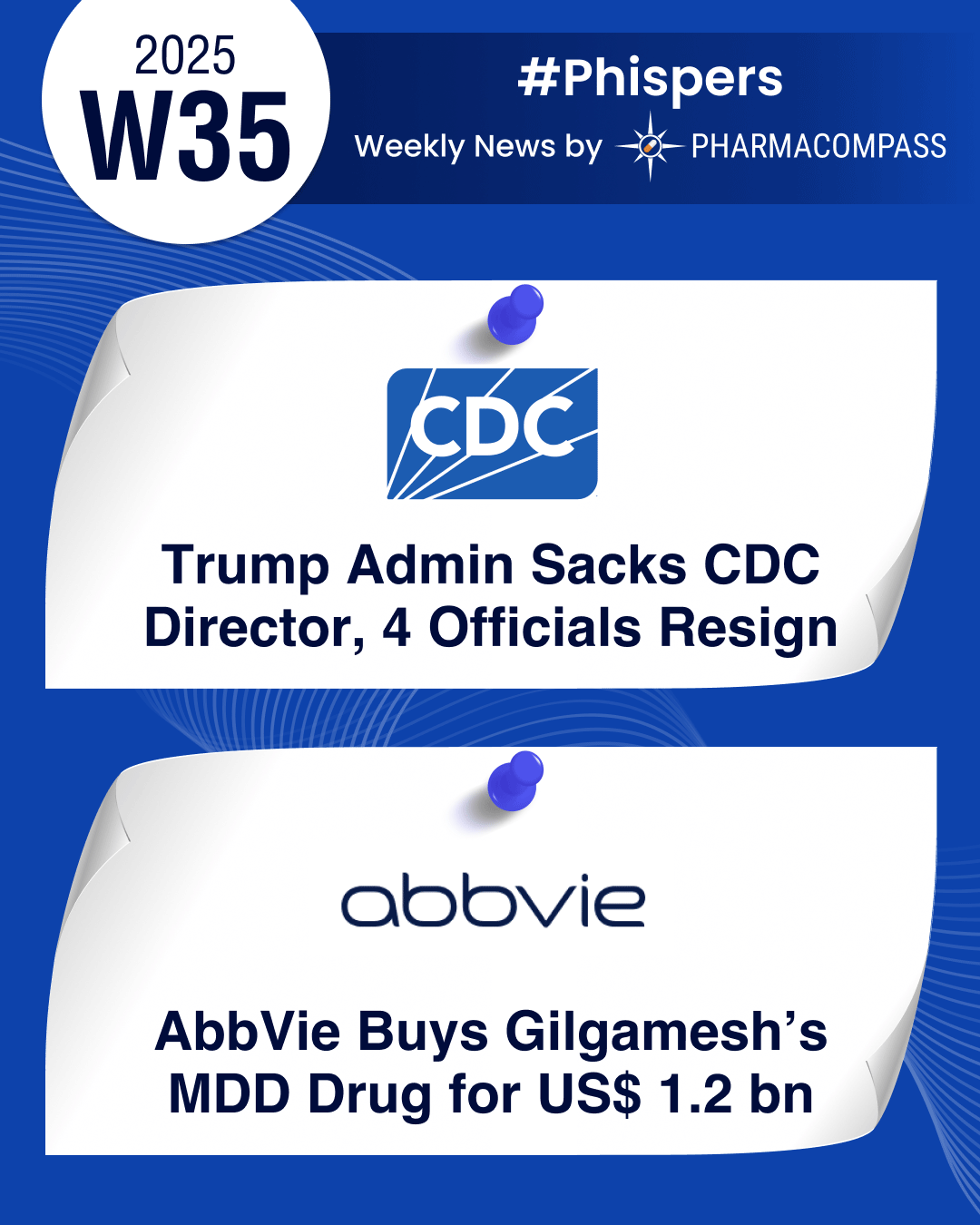
White House sacks CDC director; FDA okays Ionis’ Dawnzera, first RNA-based preventive for hereditary angioedema
The Trump administration has fired US Centers for Disease Control and Prevention (CDC) Director Susan Monarez, post a policy di...
Impressions : 1235
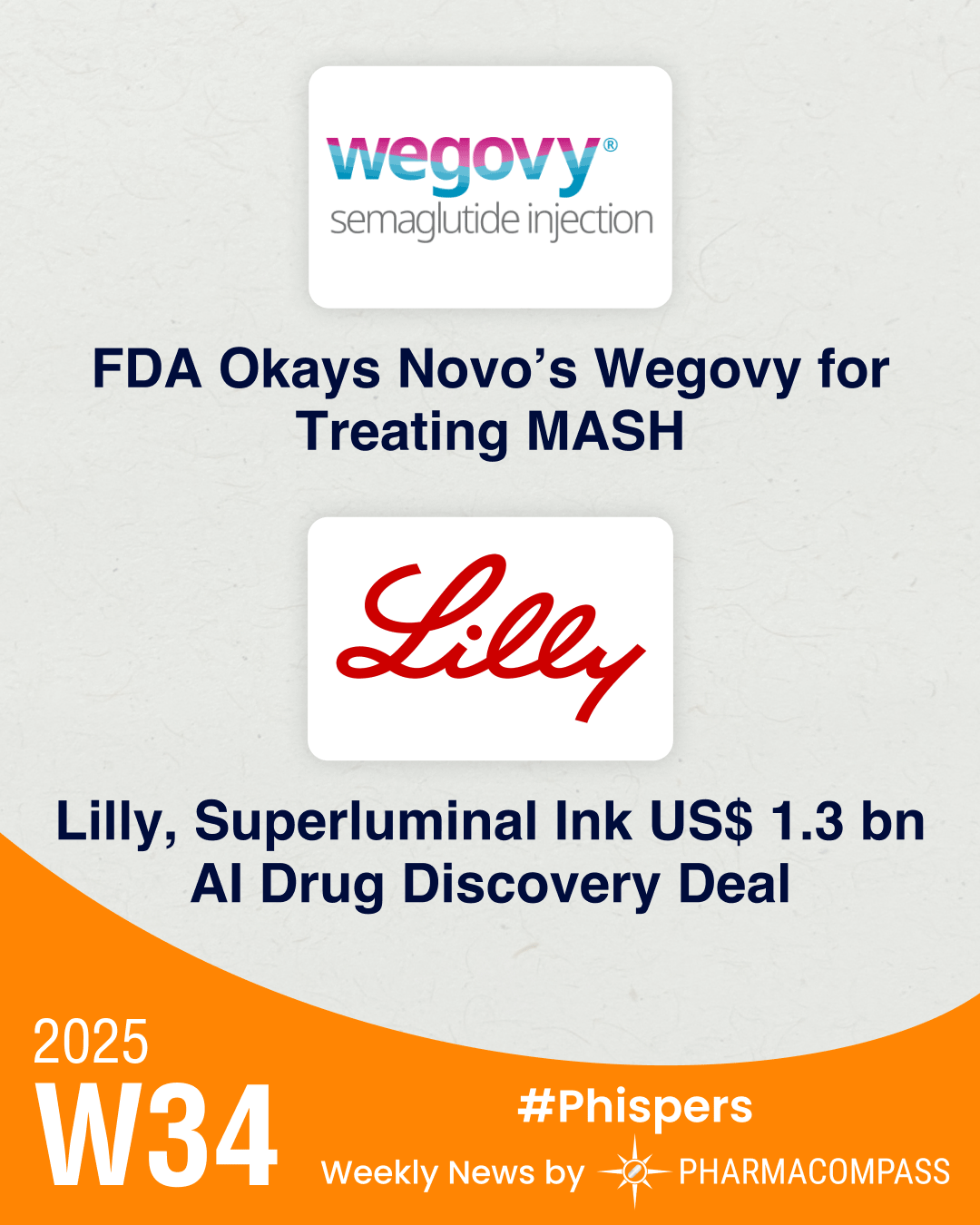
FDA grants accelerated approval to Wegovy for treating MASH; Lilly, Superluminal ink US$1.3 bn AI deal to treat obesity
This week’s Phispers brings you updates on key drug approvals. The US Food and Drug Administration (FDA) has granted acce...
Impressions : 1650
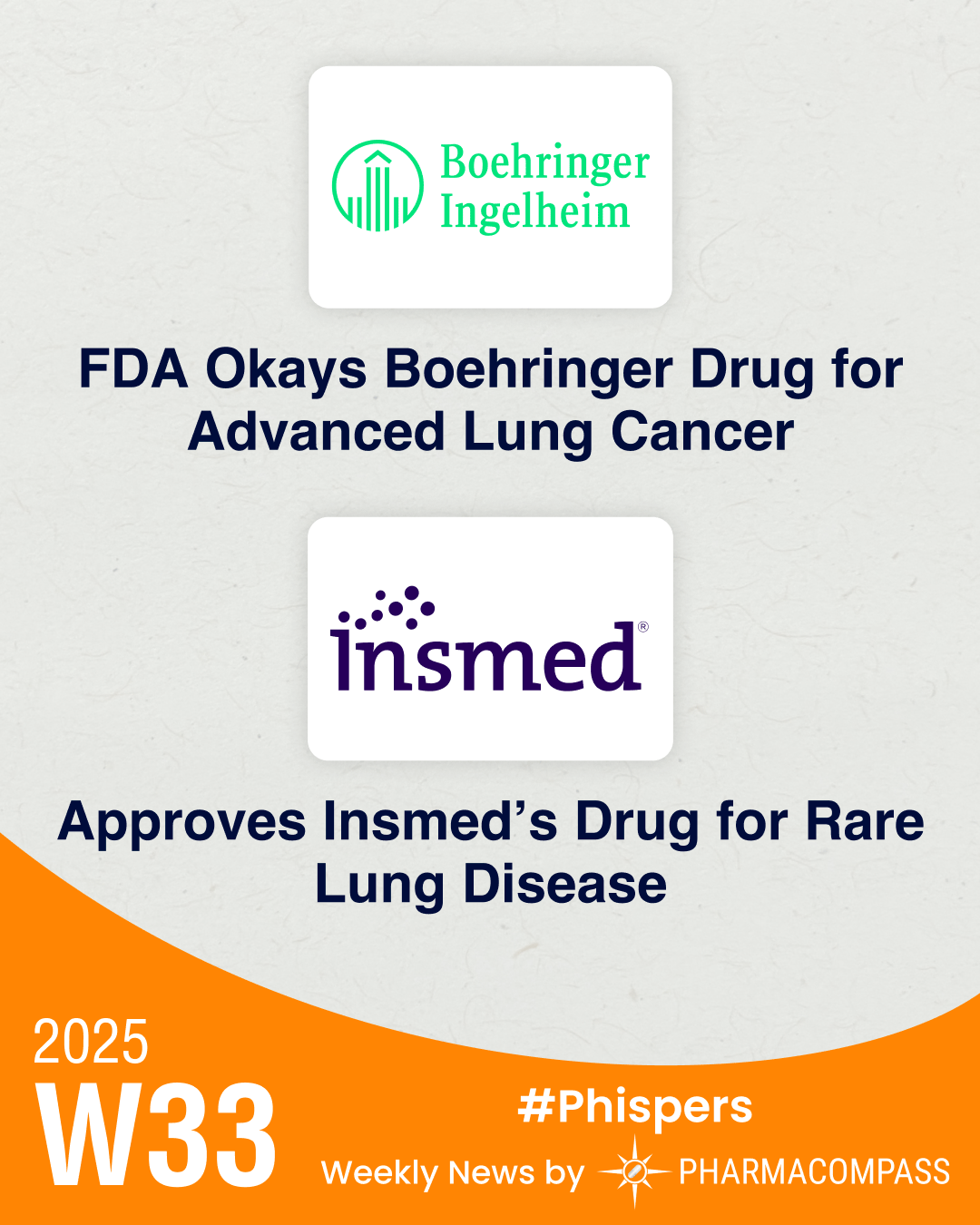
FDA grants accelerated nod to Boehringer’s lung cancer med; reinstates ousted CBER chief Vinay Prasad
The US Food and Drug Administration (FDA) has granted an accelerated approval to Boehringer Ingelheim’s Hernexeos (zonger...
Impressions : 1621
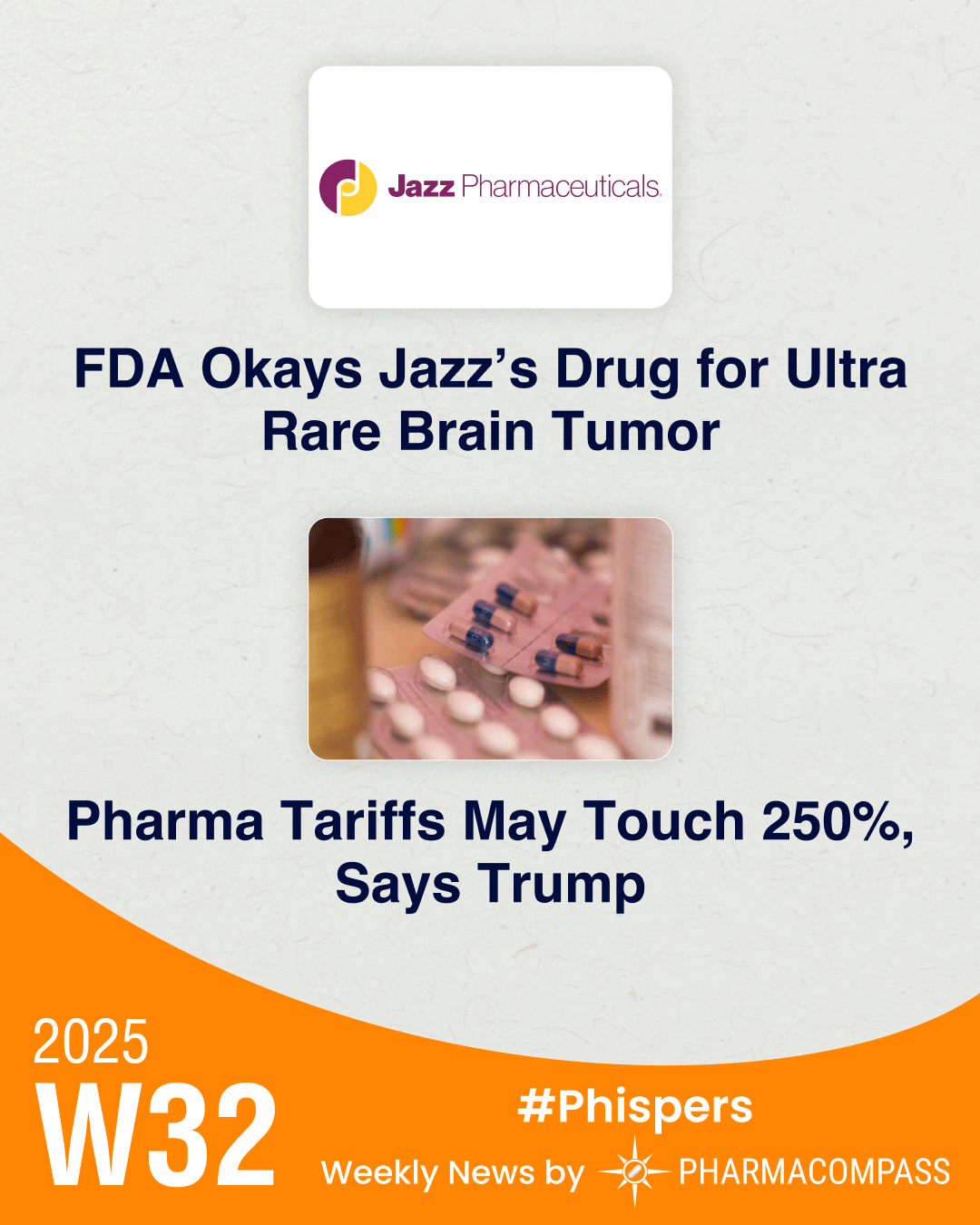
Trump says pharma tariffs may touch 250% in 18 months; FDA okays Jazz Pharma’s rare brain tumor drug
The US Food and Drug Administration (FDA) has granted an accelerated approval to Jazz Pharmaceuticals’ Modeyso, a drug th...
Impressions : 974
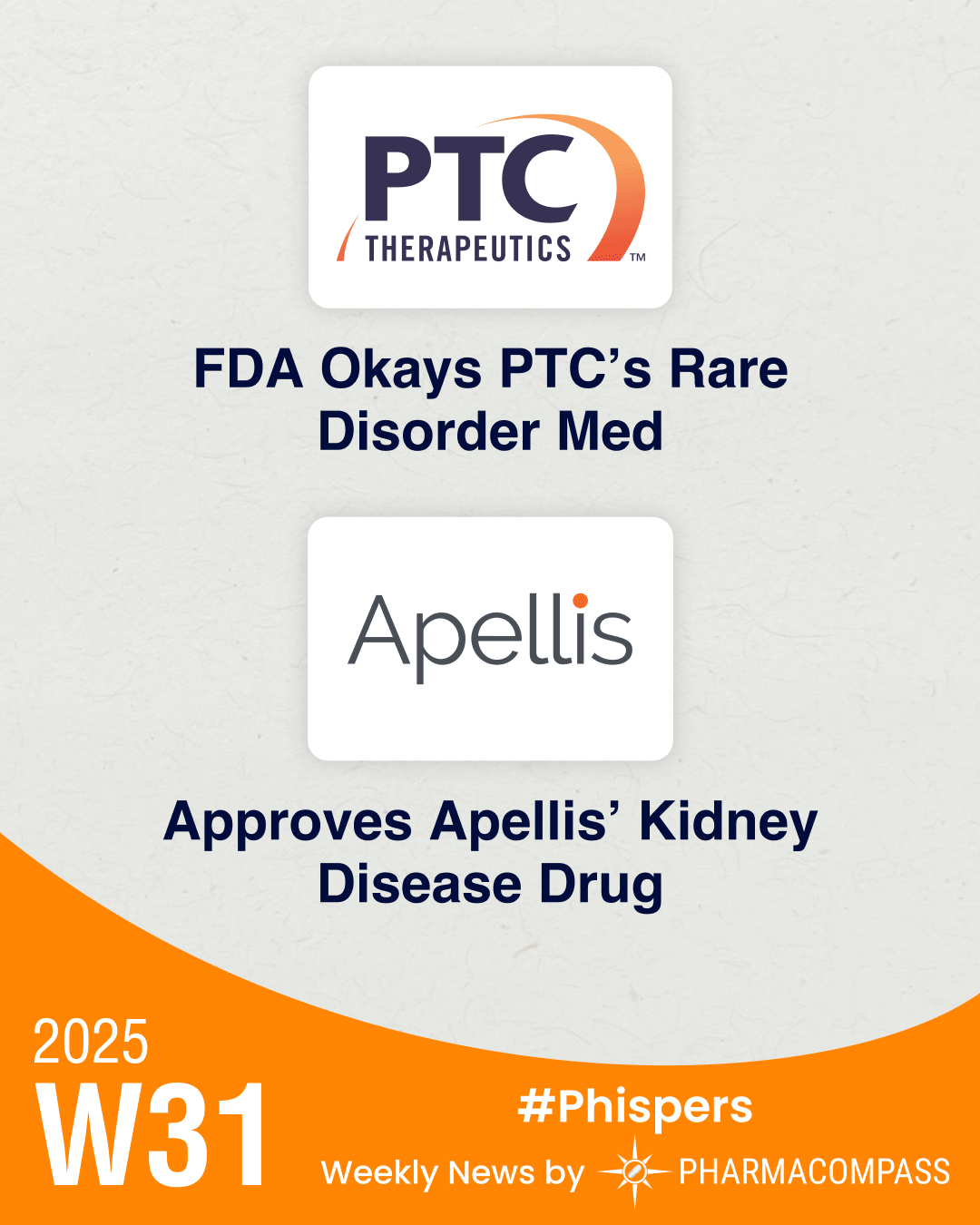
Consortium makes ~US$ 3 bn offer to buy Bavarian Nordic; FDA approves PTC’s rare genetic disorder drug
The US Food and Drug Administration (FDA) has approved PTC Therapeutics’ oral drug to treat a rare genetic disorder known...
Impressions : 1023
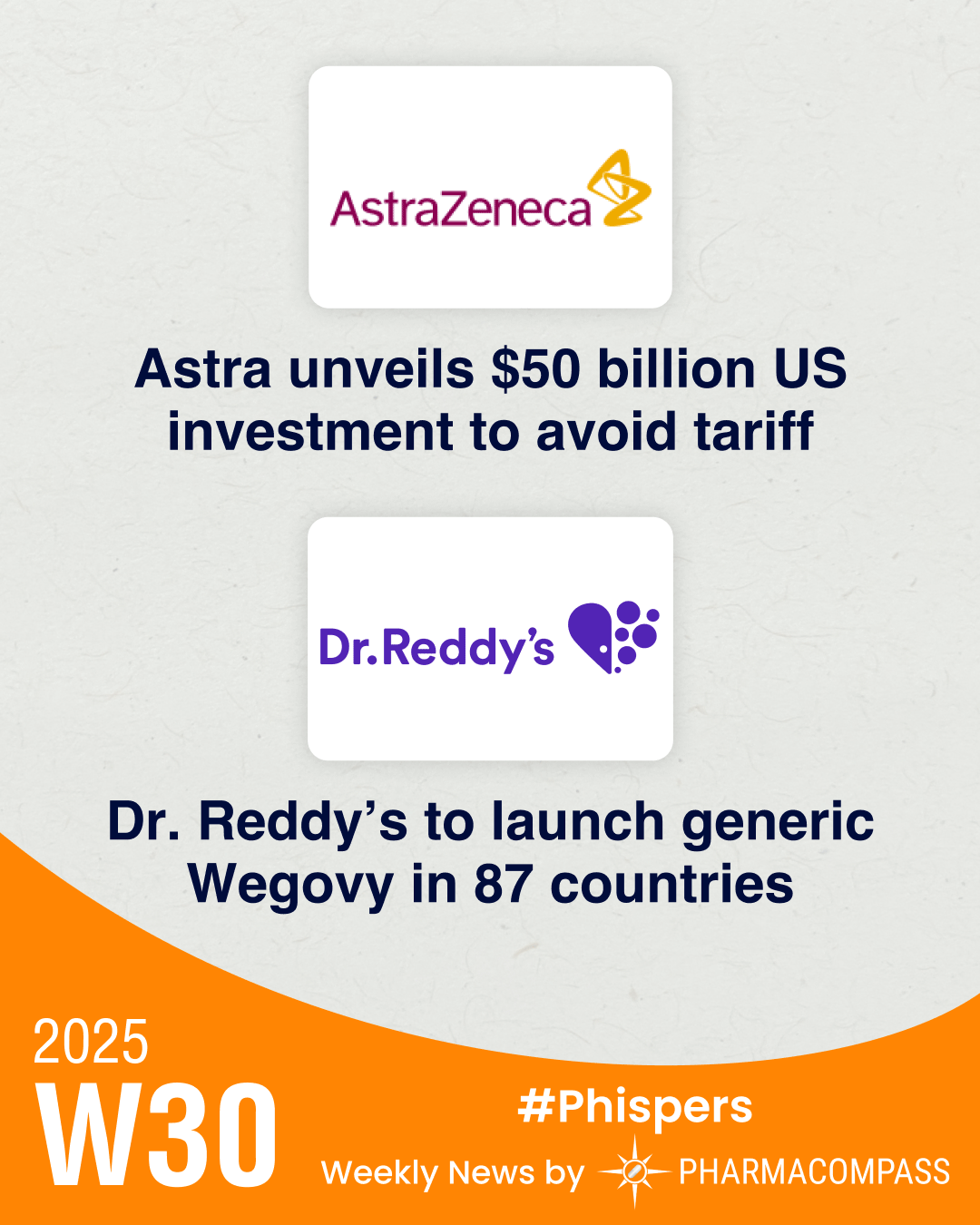
Astra to invest US$ 50 bn in US to avoid tariffs; Dr. Reddy’s to launch generic Wegovy in 87 countries next year
AstraZeneca and Biogen are the latest drugmakers to
announce investments in the US to avoid import tariffs. AstraZeneca is
in...
Impressions : 1302
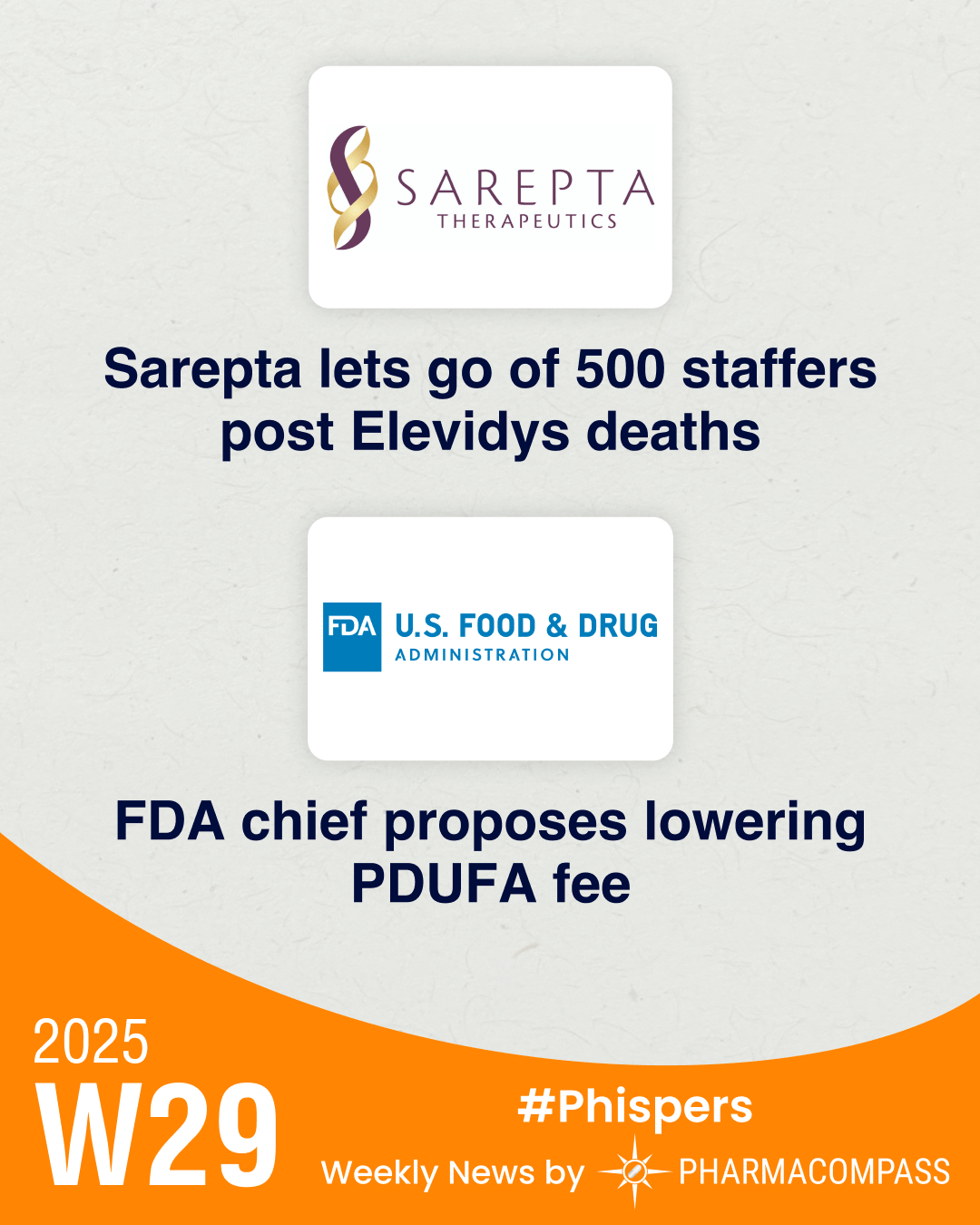
Sarepta lays off 500 employees post second death in Elevidys trial; FDA chief proposes lowering PDUFA fee
This week’s Phispers brings you updates on cell and gene therapies (CGTs). After the death of a second teenaged boy last ...
Impressions : 4351
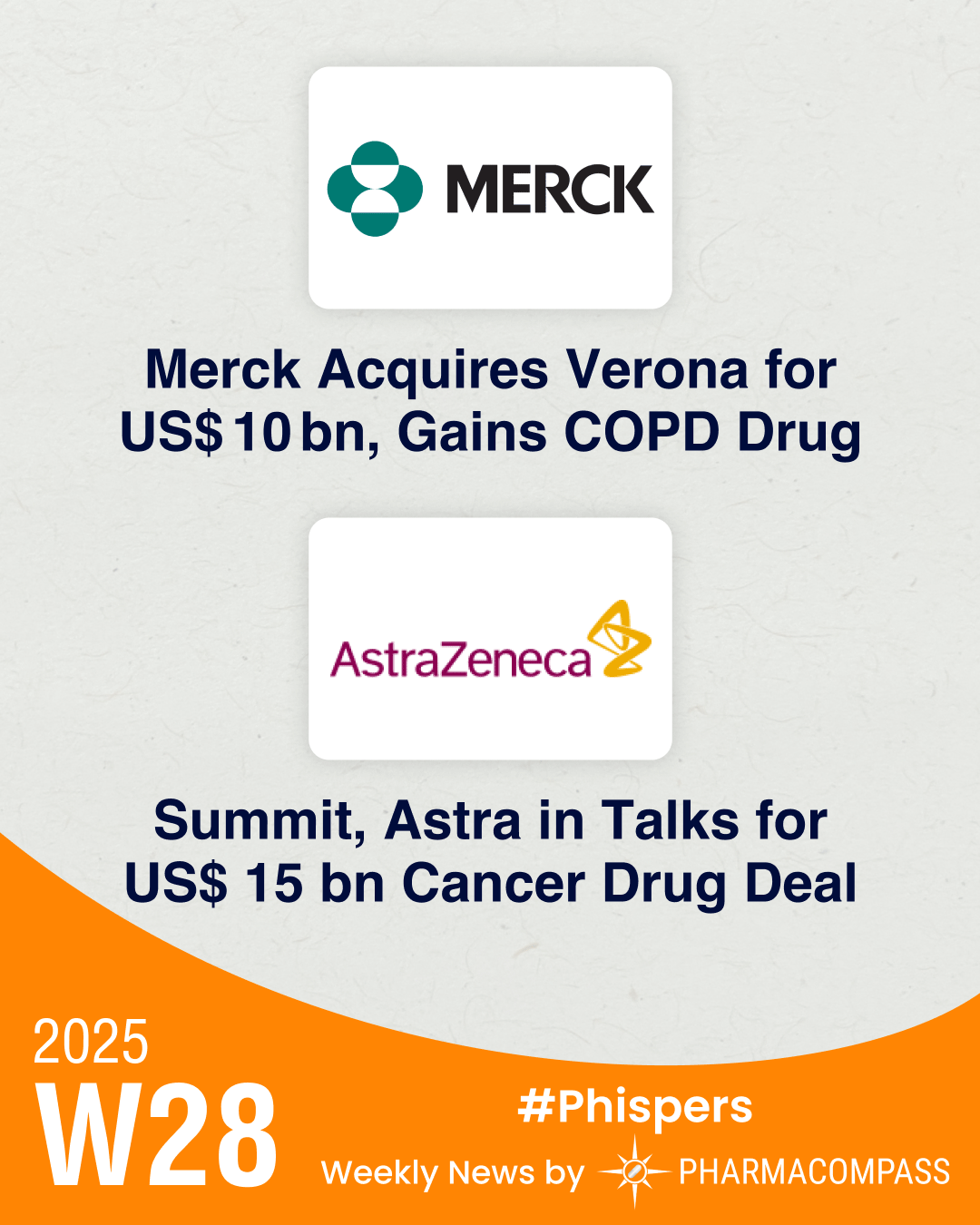
Merck buys Verona for US$ 10 bn, gains its COPD med; Summit, Astra reportedly in talks for US$ 15 bn cancer drug deal
The world of pharmaceuticals continued to witness large deals. Merck announced a US$ 10 billion acquisition of Verona Pharma, g...
Impressions : 852
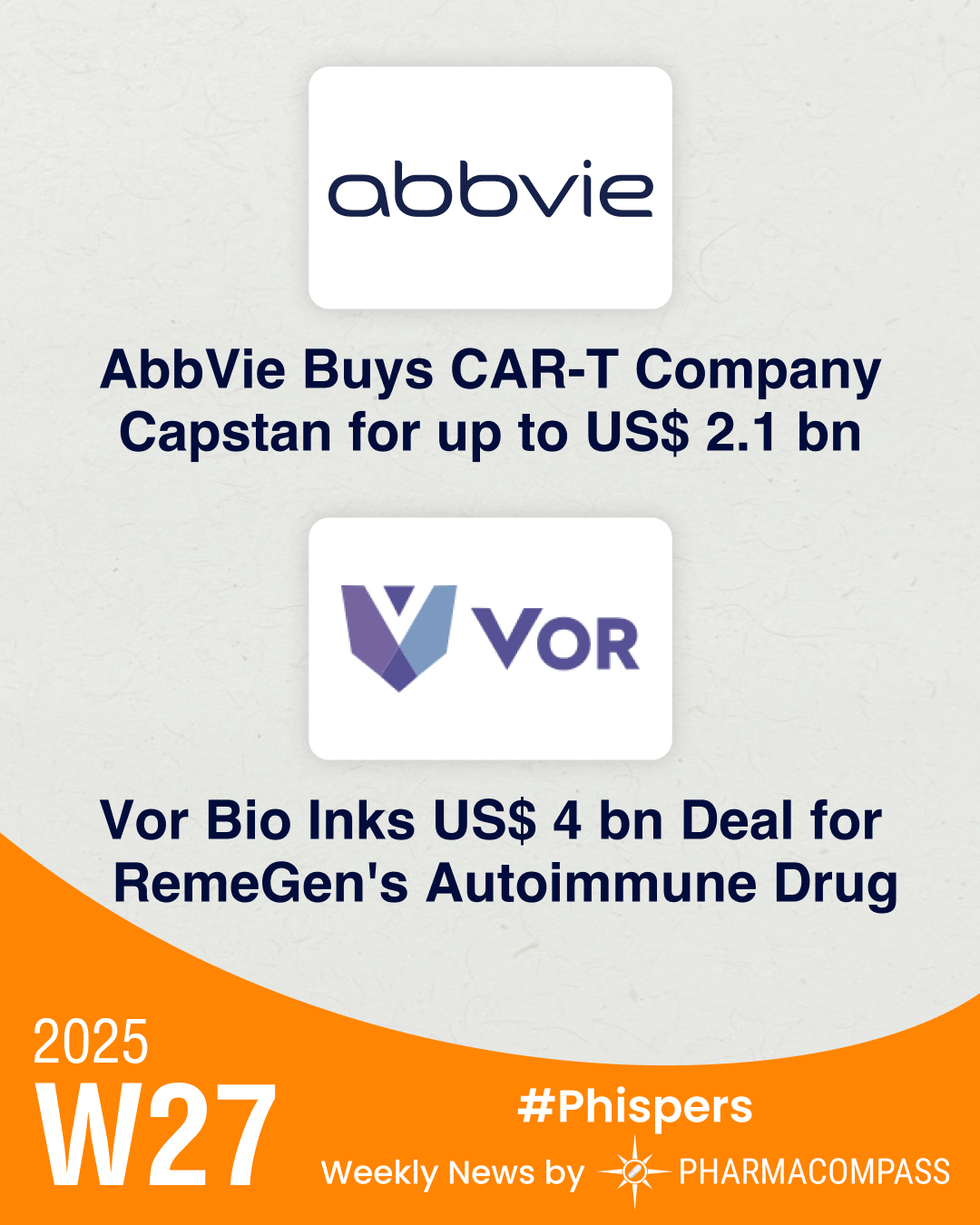
AbbVie doubles down on immunology with US$ 2.1 bn Capstan buyout; India’s Torrent buys controlling stake in JB Chem
This week in Phispers, AbbVie struck a deal worth up to US$ 2.1 billion to acquire Capstan Therapeutics and its innovative in v...
Impressions : 772
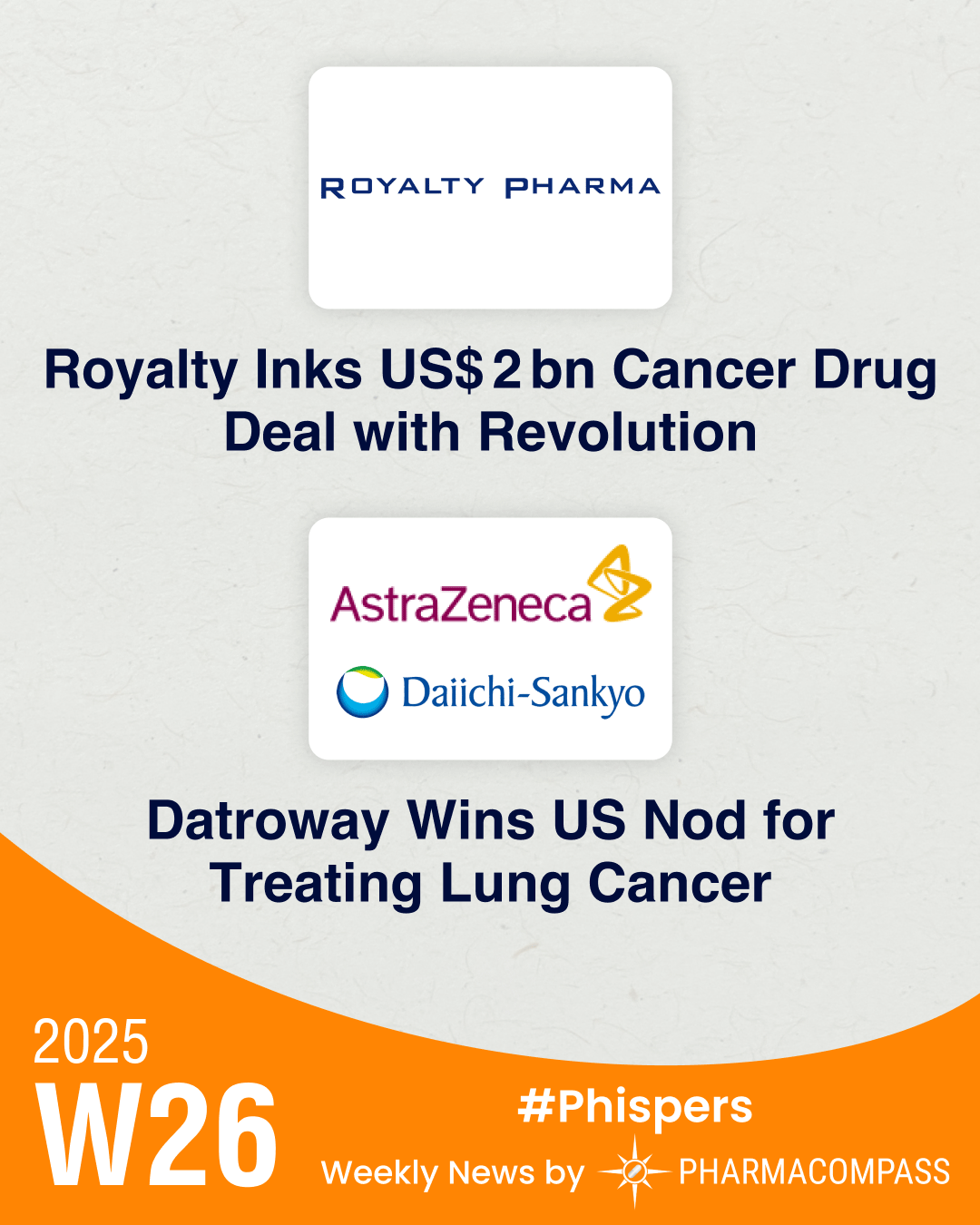
Royalty Pharma inks US$ 2 bn cancer drug deal with Revolution; Astra-Daiichi’s Datroway wins US approval for lung cancer
In news this week, Royalty Pharma committed up to US$ 2 billion to Revolution Medicines for their promising pancreatic and lung...
Impressions : 3110
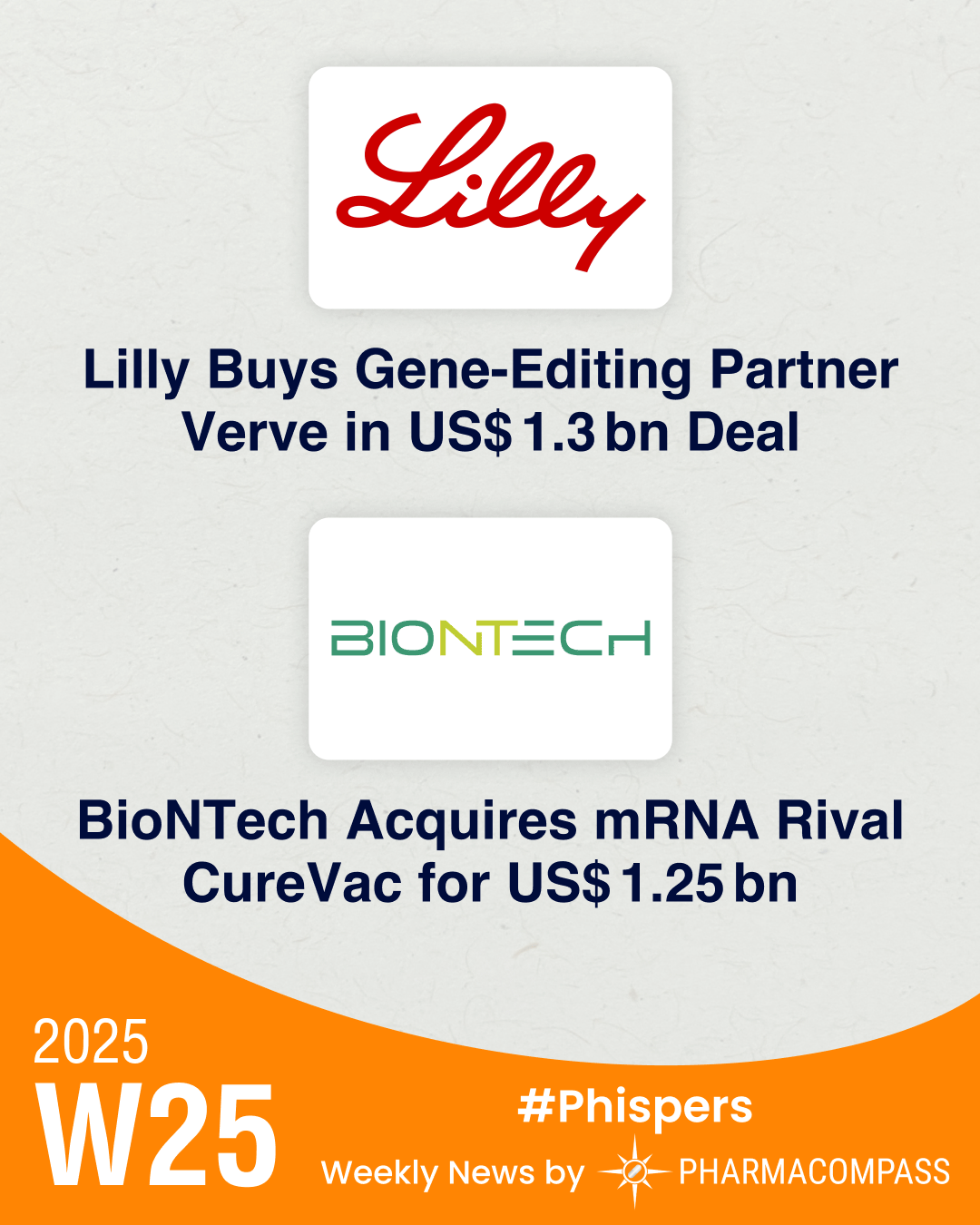
Lilly acquires gene-editing firm Verve for US$ 1.3 bn, BioNTech buys CureVac; Astra signs US$ 5.3 bn AI deal with China’s CSPC
This week’s Phispers comes with news on several M&A deals. Eli Lilly made headlines with its US$ 1.3 billion acquisition ...
Impressions : 763


 Market Place
Market Place Sourcing Support
Sourcing Support